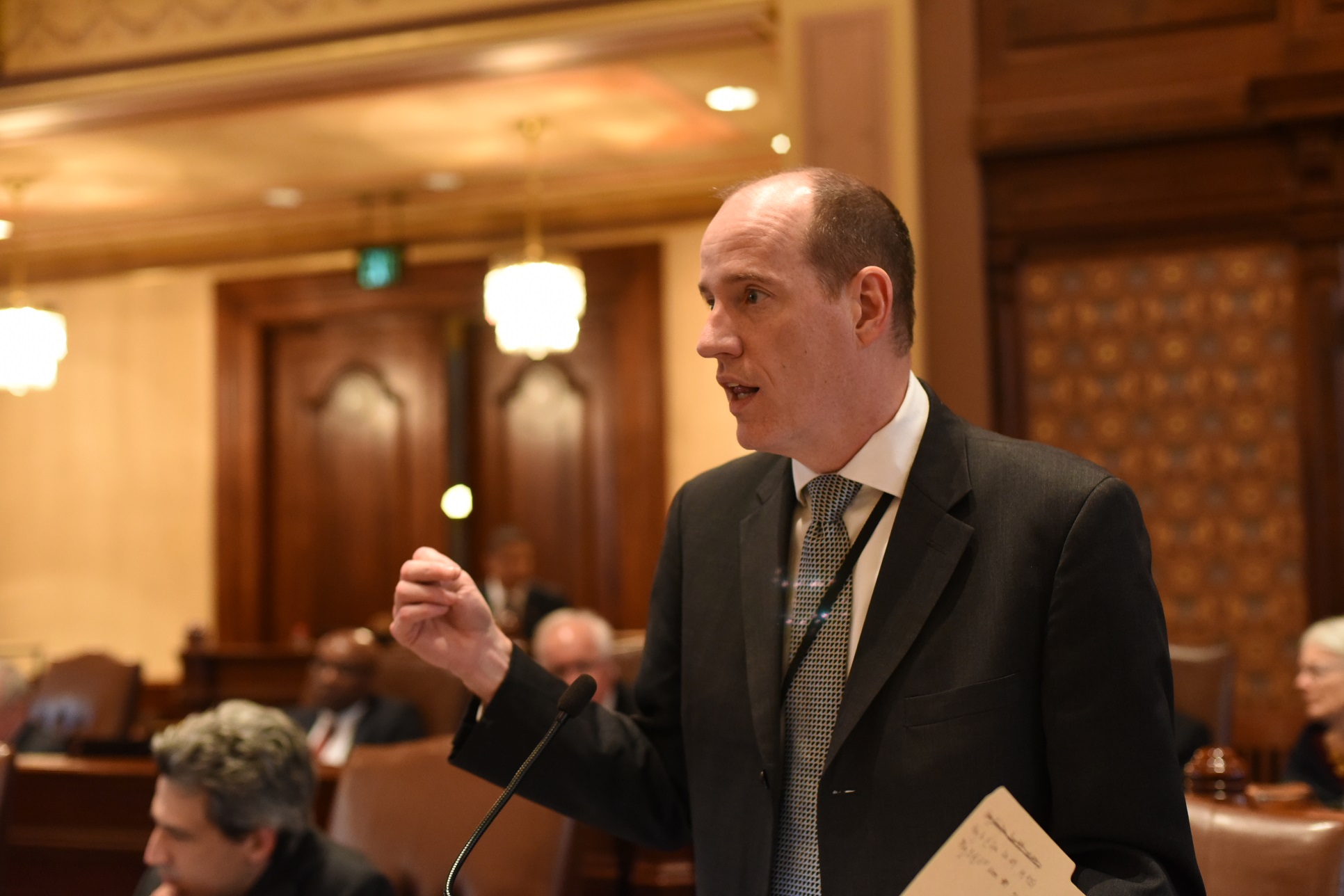- Details
- Category: Press Releases

CHICAGO – A resolution presented by State Senator Bill Cunningham celebrates the 50th anniversary of the Special Olympics and congratulates Special Olympic athletes, past and present, on their accomplishments.
“As athletes and organizers from all over the world prepare to convene in Chicago to celebrate the Special Olympics’ 50th anniversary, I’m privileged to present Senate Resolution 1796 to commemorate the athletes who have carried this movement for their continuous inspiration over the past 50 years and to encourage the next generation of athletes and volunteers to get involved,” Cunningham said.
While the official 2018 Special Olympic Games will take place in Seattle this summer, there is a week-long series of events taking place in Chicago from July 17-21 to celebrate the Games’ 50th anniversary and raise awareness and support of the Special Olympics and its “Choose to Include” movement. Over 70,000 athletes and supporters are scheduled to attend.
Earlier this year, the Chicago Park District presented the Eternal Flame of Hope Monument as a permanent tribute to the organization and its athletes. The monument sits at the entrance of Soldier Field, the site of the very first Special Olympics.
The Special Olympics was inaugurated in July of 1968 by Eunice Kennedy Shriver, the sister of President John F. Kennedy, who invited 1,000 intellectually disabled athletes from 26 states and Canada to Chicago’s Soldier Field to compete in Olympic-style track and field events.
Cunningham has been an active supporter of the Special Olympics for years, having frequently participated in the organization's Polar Plunge and the Law Enforcement Torch Run for Special Olympics Illinois to raise money and to gain awareness for the athletes who participate in the games.
- Details
- Category: Press Releases

SPRINGFIELD – Illinois residents will no longer have to pay a fee to protect their identity when freezing their credit thanks to legislation that was signed into law today.
House Bill 4095 is an initiative of Attorney General Lisa Madigan and State Senator Bill Cunningham, a Democrat representing Chicago and the Southwest Suburbs.
The new law will bar credit reporting agencies from charging consumers a fee to place or lift a freeze on their credit report, and gives consumers the ability to do so electronically or over the phone instead of by certified mail.
“This law guarantees that consumers will not have to pay a fee to protect their credit after a credit agency jeopardizes their personal information,” Cunningham said. “By updating the law to allow consumers to place or lift a credit freeze electronically or over the phone, the measure ensures consumers are able take action to prevent or minimize damage to their credit.”
This action comes in response to the massive data breach suffered by Equifax from May to July of last year. As many as 143 million Americans nationwide and 5.4 million Illinois residents may have been impacted by the breach of sensitive consumer information.
The legislation takes effect immediately.
- Details
- Category: Press Releases

SPRINGFIELD – Legislation passed by the Illinois General Assembly today would eliminate long-term delays Cook County property owners face in obtaining refunds for flawed tax assessments and overpayments.
Senate Bill 1979 aims to provide property owners with the money they are owed in a timelier manner by increasing the yearly limit on the amount of property tax overpayments that may be refunded to $5 million from $2.5 million.
Each year, the current threshold is reached very quickly, which causes a long-term backlog in refunds that property tax owners are entitled to.
SB 1979 is sponsored by State Senator Bill Cunningham and State Representative Fran Hurley, Democrats representing parts of Chicago and the Southwest Suburbs.
“Property owners should not be put on a years-long waiting list to receive money that is rightfully theirs,” Cunningham. “This legislation would alleviate that backlog by doubling the amount of money Cook County is authorized to award each year for overpaid property taxes.”
In 2017, 402 taxpayers did not receive a refund for their overpaid taxes, according to research Kensington Research & Recovery, a firm that assists taxpayers with obtaining refunds.
There is currently an estimated $94.1 million in unclaimed tax overpayments, according to the Cook County Treasurer’s office.
“Cook County’s current system for issuing refunds for overpaid property taxes is simply unsustainable. Based on preliminary data, hundreds of taxpayers are set to go another year without receiving their refunds,” Hurley said. “Senate Bill 1979 will accelerate the process in which the nearly $100 million owed to property owners is recovered.”
Under SB 1979, if payment of a claim for a refund would cause the total amount of taxes and interest for all claims to exceed $5 million for the given year, the refund will be paid in the succeeding year.
SB 1979 awaits the Governor’s signature to become law.
More Articles …
Page 46 of 86




